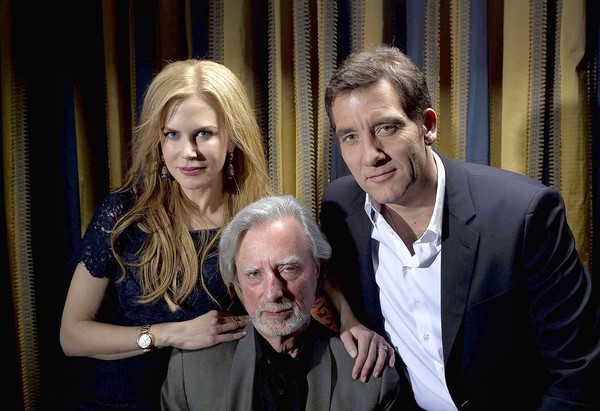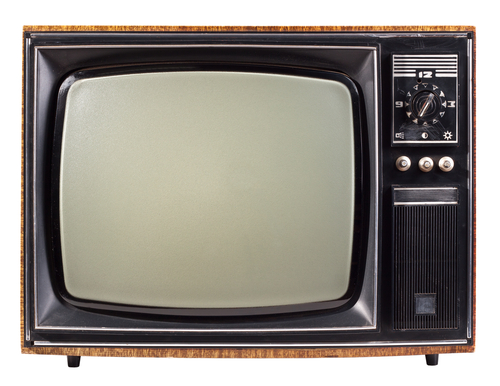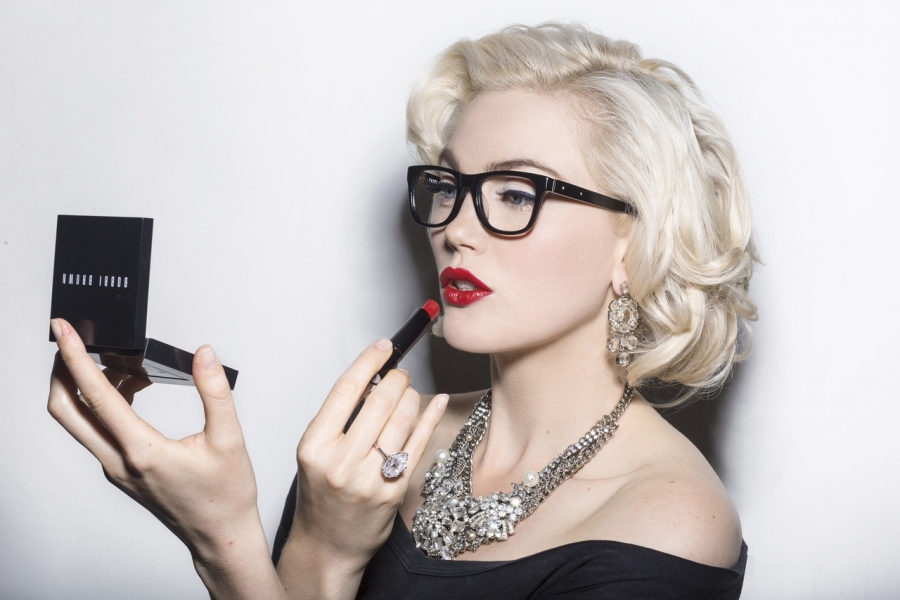Most writers can only daydream about meeting — in the flesh — the characters they've imagined. But for Ernest Hemingway, one afternoon in Key West, Fla., it came close to actually happening. One day when the writer was in his mid-30s, hanging out at a local fisherman's bar, he spotted a woman uncannily similar to the strong-willed, sexually liberated heartbreaker from his first novel.
"It's as if, borne on the sea foam, she emerged — out of his own mind," says director Phil Kaufman. "The woman of his dreams, of his own writing, came into his life."
Kaufman is not musing idly; he's recently completed directing a film about the relationship between the burly novelist and Martha Gellhorn, the intrepid war correspondent whom Kaufman sees as reminiscent of Lady Brett Ashley from "The Sun Also Rises."
After Gellhorn walked into Sloppy Joe's bar on that day in 1936, her life, like that of the novelist, was fundamentally altered. Hemingway — married at the time to Pauline Pfeiffer, his second wife — urged Gellhorn, still establishing herself as a writer, to go with him to cover the Spanish Civil War. There the two began a romance, and they were later married in what proved to be a passionate but often difficult union.
As Kaufman sees it, Hemingway's enthusiasm and support lighted a spark in Gellhorn, but that's where things got complicated. "He ignited it," says Nicole Kidman, who plays the journalist with an assertive spirit. "But once he ignited it, I don't think he wanted that flame to grow."
By the end of the marriage, things had gotten emotionally and physically brutal. But along the way, the two went on a wild ride, both as lovers and as witnesses to history, including the early stirrings of the Chinese Revolution.
"There was this five-, six-year tussle with her," says Kaufman. "It's a very mythical kind of relationship they had: She's a Hemingway heroine. The problem being: Is that what he really wanted in real life?"
A chance meeting
One irony behind "Hemingway & Gellhorn" — premiering May 28 on HBO — is that a key connection for this film about a reputedly sexist writer who sometimes struck his wives was made at a rally against domestic violence. Kaufman, who had recently lost Rose, his wife of half a century and sometime collaborator, to cancer, bumped into Kidman at the event in San Francisco. The actress had never met Kaufman before, but she admired films such as "The Unbearable Lightness of Being" and had heard of his commitment to his wife in her last years, which involved putting his career on hold to attend to her.
Kidman had read a few of Hemingway's novels and knew nothing of Gellhorn. But she was so impressed with Kaufman's relationship to Rose that her ears perked up when he mentioned that his next project was on these two outsized personalities. "Nobody was supposed to have seen the script," he says. "Two days later, she called me, and said she'd read the script, and said, 'I want to do this. I'll do it whenever you're ready.'"
Kaufman had been drawn to the project not only by an interest in Hemingway's work but by an ardor for the couple's era, the '30s and '40s. And he saw in the novelist's code of "grace under pressure" the origins of the ethos in his laconic astronauts from "The Right Stuff." He was impressed with the stripped-down power of short stories such as "Snows of Kilimanjaro" and "Hills Like White Elephants." Hemingway, says Kaufman, "combined that with a talent for living" that reminded him of his literary hero, Henry Miller (whom he conjured in the film "Henry & June").
It took several years for Barbara Turner's original script to become a reality; initially it was intended for the big screen. A reworking by writer Jerry Stahl, Kaufman says, helped the project find its voice and structure. A friend suggested Clive Owen for Hemingway's part. Though the dark, lean English actor does not much resemble Hemingway, Kaufman says, he projects both intelligence andtestosterone.
Respect for characters
Inspired by what he called "a stormin' script," Owen threw himself into the role of Papa Hemingway in a way he never had before. "At first it's daunting. God, I'm English, playing an iconic American writer. But I immersed myself in everything Hemingway. I took months and months, read everything he wrote, read everything about him. Had endless talks with Phil about him."
Owen visited places Hemingway had been — Cuba, Spain, France — struck by the adulation and fondness he seemed to leave behind him and spent days with recordings of Hemingway's voice ringing in his ears. He also put on weight to play this man of enormous appetites. But Owen does not speak with the portentous tone of the Hemingway character played by Corey Stoll in Woody Allen's"Midnight in Paris."
"I think he's an absolutely amazing writer," says Owen, who had known Hemingway's work only slightly. "A bit out of fashion at the moment, because of the whole macho thing, the bullfighting and safaris. The feminist movement buried him a bit. But I would argue that a lot of the writing is hugely sensitive. He was the beginning of the economy of language: The discipline, the way he extracted the fat and honed and honed."
Kidman, who has played Virginia Woolf, Diane Arbus and several characters from novels, calls researching literary or historical roles among her favorite challenges. "I was being educated," she says of delving into Gellhorn's life and work. "But at the same time, I was falling in love with her."
The willowy actress stretched out barefoot in a lacy dress in a hotel suite does not much resemble the toughened war correspondent she portrayed. "Phil told me, 'You're gonna have to talk differently, move differently,' I'm probably more feminine — she was more of a tomboy."
Kidman especially admired Gellhorn's combination of humanitarian spirit and sheer guts. Gellhorn became one of the century's best-regarded war correspondents in articles for Collier's, the Atlantic Monthly and other publications and also wrote fiction. (In one of the film's many dramatic moments, Gellhorn, with no press credential, impersonates a nurse to get to Normandy for D-day.) "She had a huge conviction, a belief that she was willing to fight for — to die for. And it was a man's world, still. You did not go to the front if you were a woman."
Intense relationship
"Hemingway & Gellhorn" includes scenes in which its characters are literally blended into history, as Kaufman has done with old newsreel footage since "Unbearable Lightness" and "The Right Stuff." But the film's most revealing moment is simpler, as the Gellhorn character utters a truth about the two.
"The battlefield neither of us could survive," she says, "was domestic life." The metaphor of love as war cuts both ways: The characters first make love with bombs falling around them. Conflict, both emotional and military, clearly turns them on. It also wears them out.
There were other factors as well. "You have to take into account how much he drank," says Owen, who opens the film reeling in a marlin while cronies pour rum down his throat. "You look at pictures of Hemingway, when he got together with Gellhorn, and compare them to seven years later: He looks like he aged 30 years." She often kept up with him.
Kaufman admires their intensity. He sees the writers as the living, breathing versions of the screen performances of Barbara Stanwyck, Lauren Bacall, Clark Gable and Gary Cooper — with all the tension that comes from strong personalities. "You're putting together powerful chemicals," says Kaufman. "We live in a time when the chemicals are bland."
The director notes the paradox that the novelist dismissed as a chauvinist by many helped inspire the career of a feminist hero. "She becomes one of the strongest feminine figures through her relationship with this man," he says. The two and their relationship were clearly, he says, complex. (Not least because these impassioned writers, both so full of life, ended their own with suicides.)
For all the ups and downs of Gellhorn's life — including two failed marriages and her own frustrations with motherhood and sex (she once called herself "the worst bed partner in five continents") — Kidman sees it mostly as a triumph. "I don't think she wanted to be a wife," the actress says. "She achieved what she wanted to achieve," leaving behind a strong body of work and formidable reputation.
"But it's complicated, because she did love Hemingway, and she had great fun with him. She loves him, but she knows she's dying as a writer and as a woman; I'm sure we've all been in that place. 'It's not bringing out the best in me. I'm not the best person I can be with you.' And that's very hard, when you're not at your best with someone. And at the beginning, they are at their best."
|
'Hemingway & Gellhorn': Love is a battlefield in the HBO movie
Posted on: 05/22/12
Stormy lovers Ernest Hemingway and Martha Gellhorn are played by Clive Owen and Nicole Kidman in the film directed by Phil Kaufman. COMMENTS
great cast!! I'm looking foward to the finished product. It sounds like a refreshing addition to the likes of what we have to watch today! 05/22/2012 5:40 pm Post A Comment:

|
.gif)



.jpg)

